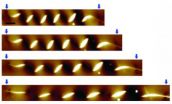(Press-News.org) Cancer researchers at The Peggy and Charles Stephenson Oklahoma Cancer Center have found a way to stop early stage pancreatic cancer in research models – a result that has far-reaching implications in chemoprevention for high-risk patients.
The research already has sparked a clinical trial in California, and the FDA-approved drug, Gefitinib, should be in clinical trials at OU's cancer center and others nationwide in about a year. The research appears in the latest issue of Cancer Prevention Research, a journal of the American Association for Cancer Research.
C.V. Rao, Ph.D., and his team of researchers were able to show for the first time that a drug used in current chemotherapy for later stages of pancreatic cancer had a dramatic effect if used earlier.
With low doses of Gefitinib, which has no known side effects at this level, scientists were able to not only stop pancreatic cancer tumors from growing, but after 41 weeks of treatment, the cancer was gone.
"This is one of the most important studies in pancreatic cancer prevention," Rao said. "Pancreatic cancer is a poorly understood cancer and the focus has been on treatment in the end stages. But, we found if you start early, there will be a much greater benefit. Our goal is to block the spread of the cancer. That is our best chance at beating this disease."
The Oklahoma cancer center research team said the finding points to an effective way to stop pancreatic cancer before it reaches later stages of development where the survival rate drops below 6 percent.
Currently, most pancreatic cancer is not identified until the later stages. However, research is moving closer to the development of an early detection test for pancreatic cancer. When that is in place, Oklahoma cancer center researchers believe they now have a method to target the cancer before it spreads.
Rao said OU officials and researchers will meet with other centers, including M.D. Anderson, whose specialists called the research "provocative," to discuss a pilot study in early 2011. Researchers hope to begin a Phase II clinical trial at the centers within 18 months. A Phase I trial is not required since the drug already has approval for human use from the U.S. Food and Drug Administration.
The clinical trials will focus on at-risk patients, particularly those with an inflammation of the pancreas called pancreatitis. The drug also could help other high risk populations, including patients with a family history of pancreatic cancer and American Indian populations or others with Type 2 diabetes.
Gefitinib works by targeting signals of a gene that is among the first to mutate when pancreatic cancer is present. By targeting the signal for tumor growth expressed by the mutated gene, researchers were able to stop the cancer's procession.
"This gene is the key in 95 percent of cases of pancreatic cancer. It is our best target," Rao said. "By targeting this gene, we can activate or inactivate several other genes and processes down the line."
Rao said the drug also could be effective in lung and colorectal cancer, but it is not known if it would work as well as in pancreatic cancer. The OU College of Pharmacy is assisting in the development of drugs and imaging techniques needed to further test Gefitinib with patients.
INFORMATION:
Rao's research was funded by a grant from the National Cancer Institute.
Located at the OU Health Sciences Center in Oklahoma City, The Peggy and Charles Stephenson Oklahoma Cancer Center is Oklahoma's only comprehensive academic cancer center, with significant programs in prevention, research, treatment and education. The center is working toward a National Cancer Institute "designated cancer center" status, the gold-standard of cancer research and treatment. More than 100 Ph.D.-level scientists are conducting innovative research at the center, and patients from every county in Oklahoma are treated by one of the largest oncology physicians groups in the state.
University of Oklahoma scientists discover way to stop pancreatic cancer in early stages
Growth inhibitor to clinical trial to help at-risk patients; leading pancreatic cancer specialists call finding 'provocative'
2011-01-12
ELSE PRESS RELEASES FROM THIS DATE:
Old-growth forests are what giant pandas need
2011-01-12
The results of a study recently published in the journal Biology Letters indicate that giant pandas need old-growth forests as much as bamboo forests. This work, which was completed through the collaborative efforts of scientists from the Chinese Academy of Science, San Diego Zoo Global, China West Normal University, China Wildlife Conservation Association and the Sichuan Forestry Department, could assist conservationists in creating strategic plans that help conserve this critically endangered bear species.
"In this study we show that pandas are associated with old-growth ...
International research team reports major findings in prevention and treatment of blood clots
2011-01-12
A worldwide research consortium that includes the University of Oklahoma Health Sciences Center has proven that a new drug is more effective and easier to use than current medicines in the prevention of blood clots following hip replacement surgery.
The results reveal a better way to prevent the formation of blood clots in the deep veins of the legs – a condition known as deep vein thrombosis (DVT). The blood clots become life-threatening pulmonary embolisms (PE) when they break free and travel to the lungs.
Gary Raskob, Ph.D., an internationally recognized DVT expert ...
North America's environmental outlook: 9 topics to watch for 2011 and beyond
2011-01-12
Montreal, 11 January 2011—What is the future for North America's environment? Much of the answer is up to us.
A new report examines the major forces and underlying trends likely to shape the environment of North America in 2030 and outlines nine areas where decisions today will affect our environmental future in varying degrees.
In fact, while the pressures on North America's environment will continue to increase over the next 20 years, the report emphasizes that it would be a mistake to assume that our choices today can't influence environmental quality down the road.
North ...
Chemical analysis confirms discovery of oldest wine-making equipment ever found
2011-01-12
Analysis by a UCLA-led team of scientists has confirmed the discovery of the oldest complete wine production facility ever found, including grape seeds, withered grape vines, remains of pressed grapes, a rudimentary wine press, a clay vat apparently used for fermentation, wine-soaked potsherds, and even a cup and drinking bowl.
The facility, which dates back to roughly 4100 B.C. — 1,000 years before the earliest comparable find — was unearthed by a team of archaeologists from Armenia, the United States and Ireland in the same mysterious Armenian cave complex where an ...
NIDCR funding to US dental schools diminished from 2005 to 2009
2011-01-12
Adding to the national debate on the state of dental research in U.S. dental schools, an article released today titled "Total NIH Support to U.S. Dental Schools, 2005-2009", published in the International and American Associations for Dental Research's Journal of Dental Research, authors J.A. Lipton and D.F. Kinane conclude that the National Institute of Dental and Craniofacial Research (NIDCR) has played a diminishing role in funding research at U.S. dental schools between 2005 and 2009.
Utilizing the online NIH RePORT, comprehensive award data were obtained for U.S. ...
Poker-faced professions take toll on employees
2011-01-12
Employees who have to maintain a neutral disposition while they are on the clock tend to spend more energy to meet that requirement; therefore, they have less energy to devote to work tasks, according to new research from Rice University, the University of Toronto and Purdue University.
The researchers found that workers who must avoid appearing either overly positive or negative -- such as journalists, health care professionals, social workers, lawyers and law enforcement officers -- suppress expressions of emotion more than workers in other service-oriented professions, ...
Coiled nanowires may hold key to stretchable electronics
2011-01-12
Researchers at North Carolina State University have created the first coils of silicon nanowire on a substrate that can be stretched to more than double their original length, moving us closer to incorporating stretchable electronic devices into clothing, implantable health-monitoring devices, and a host of other applications.
"In order to create stretchable electronics, you need to put electronics on a stretchable substrate, but electronic materials themselves tend to be rigid and fragile," says Dr. Yong Zhu, one of the researchers who created the new nanowire coils ...
UBC researchers part of Planck satellite team that uncovers secrets of the universe
2011-01-12
University of British Columbia researchers are part of European Space Agency's Plank satellite mission that is revealing thousands of "exotic" astronomical objects, including extremely cold dust clouds, galaxies with powerful nuclei, and giant clusters of galaxies.
The international collaboration of scientists from 15 countries is presenting more than 25 scientific papers today in Paris, France, on the first results from the Planck mission. Launched in 2009, the Planck satellite is probing the entire sky at microwave wavelengths from 0.35 millimetre to one centimetre. ...
Gene helps plants use less water without biomass loss
2011-01-12
WEST LAFAYETTE, Ind. - Purdue University researchers have found a genetic mutation that allows a plant to better endure drought without losing biomass, a discovery that could reduce the amount of water required for growing plants and help plants survive and thrive in adverse conditions.
Plants can naturally control the opening and closing of stomata, pores that take in carbon dioxide and release water. During drought conditions, a plant might close its stomata to conserve water. By doing so, however, the plant also reduces the amount of carbon dioxide it can take in, ...
Inside a snowstorm: Scientists obtain close-up look at Old Man Winter
2011-01-12
In this winter of heavy snows--with more on the way this week--nature's bull's-eye might be Oswego, N.Y., and the nearby Tug Hill Plateau.
There the proximity of the Great Lakes whips wind and snow into high gear. Old Man Winter then blows across New York state, burying cities and towns in snowdrifts several feet high. This season, however, something is standing in his way.
The Doppler-on-Wheels (DOW), a data-collecting radar dish, is waiting. This month and next, scientists inside the DOW are tracking snowstorms in and around Oswego to learn what drives lake-effect ...
LAST 30 PRESS RELEASES:
Jeonbuk National University researchers develop an innovative prussian-blue based electrode for effective and efficient cesium removal
Self-organization of cell-sized chiral rotating actin rings driven by a chiral myosin
Report: US history polarizes generations, but has potential to unite
Tiny bubbles, big breakthrough: Cracking cancer’s “fortress”
A biological material that becomes stronger when wet could replace plastics
Glacial feast: Seals caught closer to glaciers had fuller stomachs
Get the picture? High-tech, low-cost lens focuses on global consumer markets
Antimicrobial resistance in foodborne bacteria remains a public health concern in Europe
Safer batteries for storing energy at massive scale
How can you rescue a “kidnapped” robot? A new AI system helps the robot regain its sense of location in dynamic, ever-changing environments
Brainwaves of mothers and children synchronize when playing together – even in an acquired language
A holiday to better recovery
Cal Poly’s fifth Climate Solutions Now conference to take place Feb. 23-27
Mask-wearing during COVID-19 linked to reduced air pollution–triggered heart attack risk in Japan
Achieving cross-coupling reactions of fatty amide reduction radicals via iridium-photorelay catalysis and other strategies
Shorter may be sweeter: Study finds 15-second health ads can curb junk food cravings
Family relationships identified in Stone Age graves on Gotland
Effectiveness of exercise to ease osteoarthritis symptoms likely minimal and transient
Cost of copper must rise double to meet basic copper needs
A gel for wounds that won’t heal
Iron, carbon, and the art of toxic cleanup
Organic soil amendments work together to help sandy soils hold water longer, study finds
Hidden carbon in mangrove soils may play a larger role in climate regulation than previously thought
Weight-loss wonder pills prompt scrutiny of key ingredient
Nonprofit leader Diane Dodge to receive 2026 Penn Nursing Renfield Foundation Award for Global Women’s Health
Maternal smoking during pregnancy may be linked to higher blood pressure in children, NIH study finds
New Lund model aims to shorten the path to life-saving cell and gene therapies
Researchers create ultra-stretchable, liquid-repellent materials via laser ablation
Combining AI with OCT shows potential for detecting lipid-rich plaques in coronary arteries
SeaCast revolutionizes Mediterranean Sea forecasting with AI-powered speed and accuracy
[Press-News.org] University of Oklahoma scientists discover way to stop pancreatic cancer in early stagesGrowth inhibitor to clinical trial to help at-risk patients; leading pancreatic cancer specialists call finding 'provocative'



